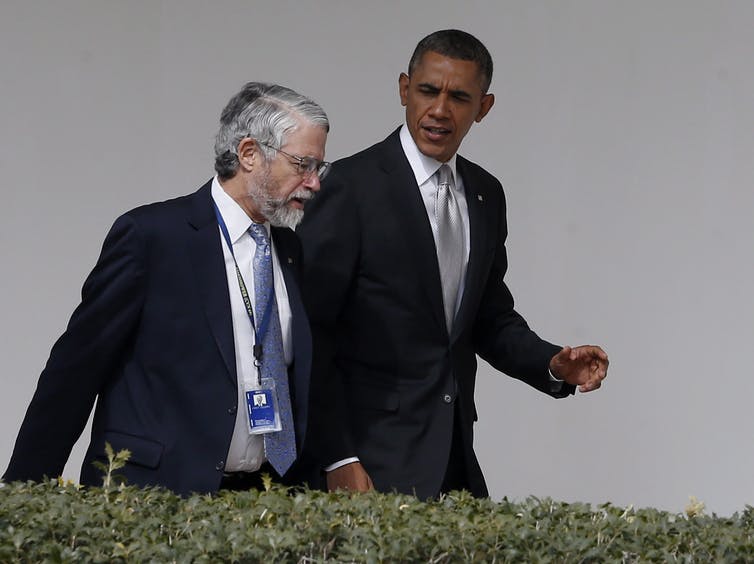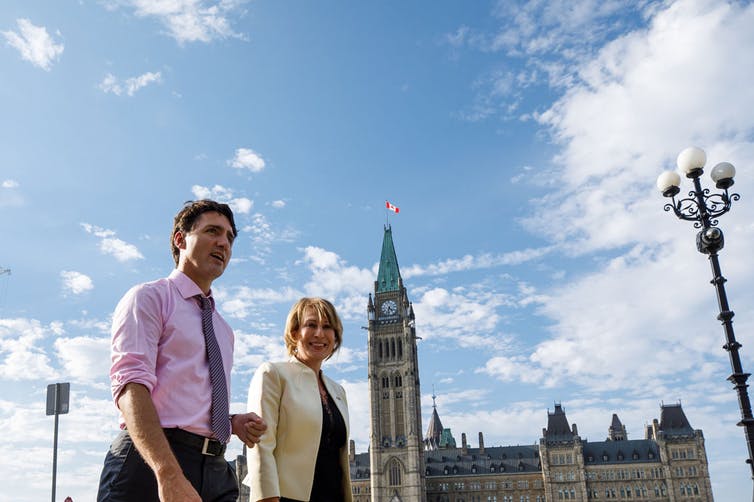There has been much consternation within the Ontario research community since Premier Doug Ford summarily dismissed the province’s first chief scientist, Molly Shoichet, after she’d been in the job for only six months.
The new government, elected on a populist wave in June, quickly fired the esteemed scientist — widely lauded for her biomedical engineering expertise and skill at communicating science — only a few days after being sworn in. Yet the new government has promised to appoint a replacement.
The move raises the question: What is the role of a “chief scientist” within government?
Spotty History
Canada has had a spotty history with such scientific advisory positions.
Arthur Carty was Canada’s first national science adviser, holding the position from 2004 to 2008, until it ended unceremoniously, as his office was largely neglected. Justin Trudeau’s government appointed Mona Nemer as chief science adviser in 2016. Québec and Ontario have also created similar roles.
These appointments offer several benefits. These advisers are a signal to the public that governments care about science, they have held leadership roles for reports on scientific questions important to Canadians — including the Naylor Report on Fundamental Science, which reviewed the status of publicly funded research in Canada — and they’ve acted as ambassadors for international scientific cooperation.
Thanks to the European Commission’s high-level Group of Chief Scientific Advisors for having me at their meeting today. We had a great discussion about best practices in #science advice and potential joint reports on new technologies and sustainable environments. #ESOF2018 pic.twitter.com/sYkNG3zB35
— Dr. Mona Nemer (@ChiefSciCan) July 9, 2018
Science Connections
Around the world, governments engage various mechanisms to connect to scientific advice and knowledge, from dedicated offices to formal engagements of arms-length scientific bodies to, well, nothing.
The U.K., for example, has had a chief science adviser since 1964. It has been held by 13 people (all men) and reports to the prime minister and cabinet.
The connection between government and scientific advice in the U.K. goes back much further, however. Since the 18th century, the government has referred questions of scientific import to the Royal Society for comment.

In the U.S., the science advisory role has traditionally been filled by the Office of Science and Technology Policy (OSTP). (Its predecessor, the Office of Science Research and Development, was famously helmed by the first U.S. science adviser, Vannevar Bush, during the Second World War.)
There is currently no science adviser leading OSTP after 27 continuous appointments. Its current de facto head has a degree in political science. His predecessor was a lauded physicist and environmental scientist.
Vacant Politics
The leadership vacancy in the OSTP is a political act, as it is in Ontario, raising the obvious question of whether the position of science adviser is a political one.
Science, per se, doesn’t care what the political leanings are of the prevailing, elected body. But a human is required to distil that information and provide it in an advisory capacity.
Peter Gluckman, New Zealand’s first science adviser (2009-2017), noted that, first and foremost, the role requires earning and keeping the public’s trust and to act as a broker rather than an advocate for science.
Indeed, many scientists think these roles are a conduit to more funding for research. That is neither true nor desirable. If a government thought that every time they sought the wisdom of their chief scientist it would be accompanied by a bill of goods, there would be little consultation.

The decision to act upon evidence or set it aside is neither the responsibility nor competency of a scientific adviser. That decision rests solely with elected politicians who, in turn, should demand all of the evidence, whether it is supportive or not for their purposes.
But it pays to remember that advisers are human (and may inject some slant), and that politicians like those who make their decisions easier, even if that means receiving advice that is partially inaccurate or incomplete.
In other words, the role of science adviser is not as straightforward as many may imagine. But it must be.
Science, Dismissed
For example, the OSTP leadership vacancy sends a clear political message: The current U.S. administration does not see value in a chief science adviser — a message amplified by severe depletion and neglect of OSTP staff and even its stub of a website.
There must be some input of science into decision-making in Washington, but the long-established structure is being dismantled and replaced by far less rigorous channels.

At a time of ubiquitous fake information, pseudoscience and a King Canute-like resistance to global warming and the benefits of vaccination, the wanton dereliction of the OSTP can only be seen as intentional dismissal of science as being relevant to policy.
The wilful ignorance of often inconvenient scientific evidence is nothing new. But in the past its occurrence existed against the backdrop of a largely uneducated populace where science challenged the beliefs and desires of the powerful few, such as hereditary land owners and religious hierarchies.
Science Is Expensive, Good Advice Is Cheap
Modern society is now utterly dependent upon technologies based on physical principles few of us understand.
We demand progress in our quality of life that can only be fuelled by more research and development. New technologies, in turn, drive substantive changes within those same societies that demand them, causing economic and population disruption — along with eradication of more diseases, less poverty and longer life expectancy.
Along with the good, there are negative consequences as a result of scientific development, including urbanization, pollution, ecosystem destruction, species extinction, etc.
In this context, the role of science advisers to government has never been more necessary and their purity of purpose more essential.

These roles require a person of the highest integrity, with the ability to communicate complexity, who appreciates and can absorb the remarkable breadth of science and is also familiar with the political process.
However, they must absolutely be aware of — and resist bias in — their advice. They must also require complete independence and respect for their role from their appointing governors. They must, first and foremost, be respected scientists who can bring the rigour of a scientific mind to government.
In this light, the OSTP vacancy could be seen as a positive outcome — an adviser who provides government with only what it wants to hear is more dangerous than having no advice at all.
Ontarians, on the other hand, are not there yet. They, and their elected representatives, should demand that the new chief science adviser must be at least as proficient, objective, rigorous, respected and gracious as Molly Shoichet.
That will be one difficult seat to fill.
Jim Woodgett is Director of Research at the Lunenfeld-Tanenbaum Research Institute at the University of Toronto.
This article was originally published on The Conversation. Read the original article.
Main image: Molly Shoichet, Ontario’s first chief scientist, was fired by the provinces newly elected premier, Doug Ford. Credit: Roberta Baker/University of Toronto, CC BY
Subscribe to our newsletter
Stay up to date with DeSmog news and alerts







